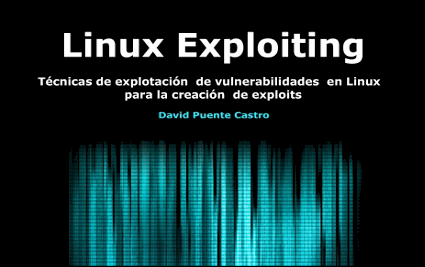


TOP
Autores
TOTAL
LecturasSET 27
73672 visitas
- Contenidos - SET Staff
- Editorial - Editor
- Guia para newbies - blackngel
- Bazar de SET - Varios Autores
- No_banners (bazar) - FCA00000
- Windoxs versus linux (bazar) - KSTOR
- PGP 8.0 (bazar) - KSTOR
- CisoPIXfirewall - bafomet
- Desbloquear consola NES - chinaski
- El SO de mi vida - KSTOR
- Proyectos, peticiones, avisos - SET Staff
- freenet - lindir
- Strhanix - Strhanix
- john-16-32 - madfran
- VIR-MOV - FCA00000
- Articulo publicado por SET en @RROBA - SET Staff
- Fuentes Extract - SET Staff
- Llaves PGP - SET Staff
Fuentes Extract
Autor: SET Staff
-[ 0x0F ]--------------------------------------------------------------------
-[ Extract ]-----------------------------------------------------------------
-[ by SET Staff ]-----------------------------------------------------SET-27-
La habitual utilidad para extraer ficheros.
<++> utils/extract.c
/* extract.c by Phrack Staff and sirsyko
*
* (c) Phrack Magazine, 1997
* 1.8.98 rewritten by route:
* - aesthetics
* - now accepts file globs
* todo:
* - more info in tag header (file mode, checksum)
* Extracts textfiles from a specially tagged flatfile into a hierarchical
* directory strcuture. Use to extract source code from any of the articles
* in Phrack Magazine (first appeared in Phrack 50).
*
* gcc -o extract extract.c
*
* ./extract file1 file2 file3 ...
*/
#include <stdio.h>
#include <stdlib.h>
#include <sys/stat.h>
#include <string.h>
#include <dirent.h>
#define BEGIN_TAG "<++> "
#define END_TAG "<-->"
#define BT_SIZE strlen(BEGIN_TAG)
#define ET_SIZE strlen(END_TAG)
struct f_name
{
u_char name[256];
struct f_name *next;
};
int
main(int argc, char **argv)
{
u_char b[256], *bp, *fn;
int i, j = 0;
FILE *in_p, *out_p = NULL;
struct f_name *fn_p = NULL, *head = NULL;
if (argc < 2)
{
printf("Usage: %s file1 file2 ... filen\n", argv[0]);
exit(0);
}
/*
* Fill the f_name list with all the files on the commandline (ignoring
* argv[0] which is this executable). This includes globs.
*/
for (i = 1; (fn = argv[i++]); )
{
if (!head)
{
if (!(head = (struct f_name *)malloc(sizeof(struct f_name))))
{
perror("malloc");
exit(1);
}
strncpy(head->name, fn, sizeof(head->name));
head->next = NULL;
fn_p = head;
}
else
{
if (!(fn_p->next = (struct f_name *)malloc(sizeof(struct f_name))))
{
perror("malloc");
exit(1);
}
fn_p = fn_p->next;
strncpy(fn_p->name, fn, sizeof(fn_p->name));
fn_p->next = NULL;
}
}
/*
* Sentry node.
*/
if (!(fn_p->next = (struct f_name *)malloc(sizeof(struct f_name))))
{
perror("malloc");
exit(1);
}
fn_p = fn_p->next;
fn_p->next = NULL;
/*
* Check each file in the f_name list for extraction tags.
*/
for (fn_p = head; fn_p->next; fn_p = fn_p->next)
{
if (!(in_p = fopen(fn_p->name, "r")))
{
fprintf(stderr, "Could not open input file %s.\n", fn_p->name);
continue;
}
else fprintf(stderr, "Opened %s\n", fn_p->name);
while (fgets(b, 256, in_p))
{
if (!strncmp (b, BEGIN_TAG, BT_SIZE))
{
b[strlen(b) - 1] = 0; /* Now we have a string. */
j++;
if ((bp = strchr(b + BT_SIZE + 1, '/')))
{
while (bp)
{
*bp = 0;
mkdir(b + BT_SIZE, 0700);
*bp = '/';
bp = strchr(bp + 1, '/');
}
}
if ((out_p = fopen(b + BT_SIZE, "w")))
{
printf("- Extracting %s\n", b + BT_SIZE);
}
else
{
printf("Could not extract '%s'.\n", b + BT_SIZE);
continue;
}
}
else if (!strncmp (b, END_TAG, ET_SIZE))
{
if (out_p) fclose(out_p);
else
{
fprintf(stderr, "Error closing file %s.\n", fn_p->name);
continue;
}
}
else if (out_p)
{
fputs(b, out_p);
}
}
}
if (!j) printf("No extraction tags found in list.\n");
else printf("Extracted %d file(s).\n", j);
return (0);
}
/* EOF */
<--> 




